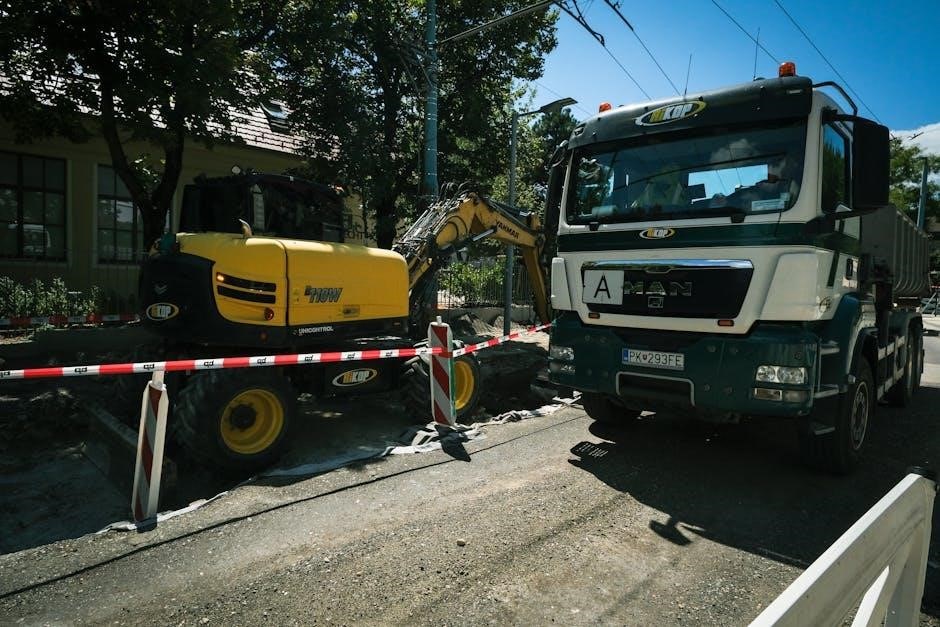The CPCS 360 Excavator Renewal Test is essential for operators with expired or near-expired cards, ensuring continued certification and compliance with safety standards in construction environments.
Overview of the CPCS Renewal Process
The CPCS renewal process is designed to ensure operators maintain their competence and stay updated with industry standards. Operators must renew their cards every five years, demonstrating ongoing proficiency. The process begins with registration and preparation, followed by a theory test. Free online resources, such as mock tests and study guides, are widely available to aid preparation. Candidates must answer at least 16 out of 20 multiple-choice questions correctly within 60 minutes to pass. Proper preparation and practice are crucial for success, as the test assesses both safety knowledge and technical understanding. Renewal ensures compliance with legal and safety requirements, maintaining operator credibility and employability in the construction sector.
Importance of Preparation for the CPCS 360 Excavator Test
Preparation is critical for success in the CPCS 360 Excavator Renewal Test, as it ensures operators are well-versed in safety protocols, technical knowledge, and operational best practices. Without proper preparation, candidates may struggle with the test’s 20 multiple-choice questions, which must be answered within 60 minutes. Free online resources, such as mock tests and study guides, provide valuable insights into the exam format and content. Understanding key topics like health and safety protocols, excavator machinery, and site-specific measures is essential. Preparation also helps manage time effectively during the test, reduces anxiety, and builds confidence. Thorough study ensures operators can apply their knowledge in real-world scenarios, ultimately achieving the required passing score of 16 out of 20. This ensures they remain certified and meet industry standards.
Benefits of Using Free Online Resources for Test Preparation
Free online resources provide numerous benefits for CPCS 360 Excavator Renewal Test preparation, offering accessible and cost-effective study materials. These resources include mock tests, PDF guides, and practice questions that simulate the actual exam format. They allow candidates to familiarize themselves with the test structure, including the 20 multiple-choice questions and 60-minute time limit. Online platforms also offer immediate feedback, helping users identify weaknesses and focus on areas needing improvement. Additionally, free resources enable self-paced learning, allowing operators to study according to their schedules. Using these tools enhances confidence and reduces exam anxiety, ensuring better performance. Overall, free online resources are invaluable for efficient and effective test preparation, aiding candidates in achieving the required passing score of 16 out of 20.
CPCS 360 Excavator Test Structure and Format
The test consists of 20 multiple-choice questions with a 60-minute time limit. Candidates must answer at least 16 questions correctly to pass, ensuring competence in safe excavator operations.
Number of Questions and Time Limit
The CPCS 360 Excavator Renewal Test features 20 multiple-choice questions, providing a comprehensive assessment of an operator’s knowledge and understanding. Candidates are allotted 60 minutes to complete the test, ensuring ample time to review and answer each question carefully. This structure is designed to evaluate both time management skills and technical proficiency. The 60-minute window is sufficient for most candidates to work through the questions methodically, reducing the likelihood of rushed decisions. With 20 questions, the test strikes a balance between thoroughness and efficiency, covering a wide range of topics without overwhelming the candidate. Proper time allocation is key to achieving a passing score.
Passing Score and Grading Criteria
To pass the CPCS 360 Excavator Renewal Test, candidates must correctly answer at least 16 out of 20 questions, achieving an 80% score. This grading criterion ensures a high standard of competence. The test evaluates both theoretical knowledge and practical application, with each question contributing equally to the final score. Immediate feedback is provided upon completion, highlighting correct and incorrect answers. This transparent grading system allows candidates to identify areas for improvement; The stringent passing criteria guarantee that operators meet the necessary safety and operational standards, maintaining the integrity of the CPCS certification. Consistent with industry requirements, the test upholds rigorous assessment standards to ensure operator proficiency and workplace safety.
Multiple-Choice Question Format and Examples
The CPCS 360 Excavator Renewal Test features a multiple-choice format, with each question offering four possible answers. Candidates must select the correct option to progress. Questions are designed to assess knowledge of safety protocols, technical operations, and best practices. For example, a question might ask:
“What is the primary purpose of using a stop block or earth bank at a trench discharge point?”
A) To prevent equipment damage
B) To stabilize the trench edge
C) To redirect water flow
D) To secure the excavator
Correct answers are provided to aid learning. Another example:
“What should you do if you notice an oil leak in the quick-hitch coupler?”
A) Continue operating cautiously
B) Shut down the excavator immediately
C) Increase hydraulic pressure
D) Ignore it if minor
These questions ensure operators are well-versed in critical scenarios, enhancing workplace safety and efficiency.

Key Topics Covered in the CPCS 360 Excavator Test
The test covers health and safety protocols, technical knowledge of excavator machinery, and site-specific safety measures, ensuring operators are fully prepared for safe and efficient operations.
Health and Safety Protocols for Excavator Operations
Health and safety protocols are critical in excavator operations to prevent accidents. Operators must wear PPE, conduct pre-shift inspections, and ensure proper use of stop blocks or earth banks. Testing includes questions on hazard identification, emergency procedures, and compliance with safety regulations. Proper use of hard hats is mandatory except when leaving the cab after parking and switching off. Understanding oil leaks and attachment release mechanisms is vital for safe operation. Regular checks and adherence to site-specific safety measures ensure a secure working environment, minimizing risks and ensuring operator and site safety.
Technical Knowledge of Excavator Machinery and Attachments
Technical knowledge of excavator machinery and attachments is a core component of the CPCS renewal test. Operators must understand the functionality of various attachments, such as quick-hitch couplers and lifting accessories. Questions focus on identifying mechanical issues, like oil leaks, which can lead to attachment release. Knowledge of boom slew mechanisms and their applications is also tested. Proper lifting techniques, especially for long loads, require the use of swivelling accessories to ensure stability. Familiarity with hydraulic systems and their maintenance is crucial. This expertise ensures operators can handle machinery efficiently and safely, adhering to technical standards and best practices in construction and excavation environments.
Site-Specific Safety Measures and Best Practices
Site-specific safety measures are critical for excavator operations, ensuring adherence to workplace protocols and minimizing risks. Operators must be aware of stop block or earth bank requirements at trench discharge points, as outlined in NOCN Job Cards. Proper placement of these barriers prevents equipment movement during operations. Safety practices also include regular site assessments to identify hazards and implement controls. Understanding when personal protective equipment (PPE) is necessary, such as hard hats, is essential. For example, a hard hat may not be required when leaving the cab for a break after parking and switching off the machine. Adhering to these best practices ensures compliance with safety standards and promotes a safe working environment for all personnel involved in excavation activities.

Sample Questions and Answers for Practice
Practice with 20 multiple-choice questions, focusing on safety protocols, technical knowledge, and real-world scenarios. Examples include oil leak risks and proper lifting techniques for long loads.

Common Test Questions on Excavator Safety
Common questions focus on critical safety measures, such as when a hard hat is not required, proper handling of oil leaks in quick-hitch couplers, and risks of losing pressure. Another example asks about situations where a hard hat is unnecessary, such as after parking and switching off the machine. Questions also address the dangers of long loads and the need for swivelling lifting accessories. Understanding these scenarios is crucial for safe excavator operation and passing the renewal test. These questions ensure operators are well-versed in preventing accidents and maintaining a safe working environment. Regular practice with such questions helps reinforce safety protocols and prepares candidates for real-world challenges.
Typical Technical Questions and Solutions
Technical questions focus on machinery operation and maintenance, such as identifying oil leaks in quick-hitch couplers, which can cause attachment release. Another example asks why smaller excavators can slew the boom, mounted on a king post, to enhance maneuverability. Solutions emphasize understanding hydraulic systems and attachment functionality. These questions test knowledge of excavator components and their practical applications. For instance, explaining the purpose of a swiveling lifting accessory for long loads highlights the importance of proper equipment usage. Correct answers demonstrate a clear grasp of technical specifications and safe operating practices, ensuring operators can handle machinery effectively and prevent potential malfunctions. Regular review of such questions improves technical proficiency and ensures compliance with industry standards.
Scenario-Based Questions for Real-World Application
Scenario-based questions simulate real-world situations, testing operators’ ability to apply knowledge in practical contexts. For example, a question might describe an emergency situation, such as an oil leak in the quick-hitch coupler, and ask how to safely respond. Another scenario might involve selecting the correct attachment for a specific task, like using a swivelling lifting accessory for long loads. These questions assess problem-solving skills and the ability to make sound decisions under pressure. By practicing these scenarios, operators can better prepare for unexpected challenges on-site, ensuring safe and efficient operation of the excavator. Such questions are crucial for reinforcing both theoretical knowledge and practical experience, helping operators excel in real-world applications. They also highlight the importance of adhering to safety protocols and best practices in diverse working conditions.
Thorough preparation, time management, and practicing with mock tests are key to passing the CPCS 360 Excavator Renewal Test. Stay focused, review safety protocols, and apply real-world knowledge confidently.

Strategies for Effective Test Preparation
To excel in the CPCS 360 Excavator Renewal Test, adopt a structured study plan. Begin by reviewing the test format and focus on key topics like safety protocols, machine technicalities, and site-specific measures. Utilize free online resources, such as mock tests and PDF guides, to familiarize yourself with question types and improve time management. Practice answering multiple-choice questions within the 60-minute window to build confidence. Prioritize understanding hand signals, attachment safety, and emergency procedures; Regularly review health and safety regulations, as they form a significant part of the test. Finally, take breaks to avoid burnout and ensure a fresh, focused mindset on exam day.
- Practice with timed mock tests.
- Focus on safety and technical knowledge.
- Review site-specific safety measures.
Importance of Mock Tests for Confidence Building
Mock tests are a critical tool for building confidence before taking the CPCS 360 Excavator Renewal Test. They simulate real exam conditions, helping you assess your readiness and identify weak areas. By practicing with timed tests, you improve time management and reduce exam-day anxiety. Mock tests also familiarize you with question formats, such as multiple-choice queries, enhancing your ability to respond quickly and accurately. Additionally, reviewing answers after each test allows you to understand mistakes and reinforce learning. Regular practice boosts familiarity with technical topics like excavator safety and operations, ensuring a confident performance during the actual renewal test.
Next Steps After Passing the Renewal Test
After successfully passing the CPCS 360 Excavator Renewal Test, the next step is to apply for your renewed CPCS card. Ensure all required documentation, including proof of identity and recent training, is submitted. Once approved, your new card will be issued, valid for five years. Stay updated with industry standards by engaging in Continuous Professional Development (CPD). Regularly review safety protocols and technical advancements to maintain competence. Employers may require additional site-specific training, so check with your supervisor for any further obligations. Keeping your skills sharp ensures compliance and ongoing employment opportunities in construction and plant operations.

